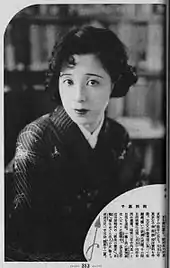Yoshiko Okada
Yoshiko Okada (岡田嘉子, Okada Yoshiko, 21 April 1902 – 10 February 1992) was a Japanese film and stage actress who was most famous for her defection to the Soviet Union.
Yoshiko Okada | |
|---|---|
 Yoshiko Okada circa 1935 | |
| Born | April 21, 1902 |
| Died | February 10, 1992 (aged 89) |
| Nationality | Japanese |
| Occupation | Film actress |
Early career

Yoshiko Okada was born in Hiroshima Prefecture in 1902. She made her film debut in 1923 at Nikkatsu in Eizō Tanaka's Dokuro no mai.[1]
Defection
On 3 January 1938, Okada defected to the Soviet Union with her lover Ryōkichi Sugimoto,[2] seeking freedom from the militaristic regime of Imperial Japan and hoping to study theater with other Japanese in the USSR.[3] Sugimoto, however, was arrested and executed as a spy and Okada spent the next ten years in a prison camp.[2]
Late career
At the end of her confinement, Okada began to work for Radio Moscow and eventually got to study at the Lunacharsky State Institute for Theatre Arts. She helped stage a play and was selected to co-direct the film Ten Thousand Boys with Boris Buneyev, a work that has been called "the first Russian film about Japan not intended to be a depiction of the 'vicious Japanese enemy.'"[2]
Selected filmography
- Tora-san's Sunrise and Sunset (男はつらいよ 寅次郎夕焼け小焼け Otoko wa Tsurai yo: Torajirō Yūyake Koyake) (1976)
- An Inn in Tokyo (東京の宿 Tōkyō no yado) (1935)
- Woman of Tokyo (東京の女 Tōkyō no Onna) (1933)
References
- "Okada Yoshiko". Nihon jinmei daijiten+Plus. Kōdansha. Retrieved 21 July 2014.
- Melnikova, Irina (2002). "Representation of Soviet-Japanese Encounters in Co-production Feature Films Part 1. The Musical Harmony". Doshisha Studies in Language and Culture. 5 (1): 51–74.
- Kato, Tetsuro (2000). "The Japanese Victims of Stalinist Terror in the USSR". Hitotsubashi Journal of Social Studies. 32 (1): 1–13.